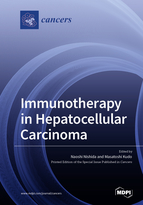Immunotherapy in Hepatocellular Carcinoma
A special issue of Cancers (ISSN 2072-6694). This special issue belongs to the section "Cancer Immunology and Immunotherapy".
Deadline for manuscript submissions: closed (30 June 2020) | Viewed by 71599
Special Issue Editors
Interests: hepatocellular carcinoma; molecular classification; tumor microenvironment; genome; epigenome; transcriptome; diagnosis; treatment; molecular targeted agent; multikinase inhibitor; immune checkpoint inhibitor; artificial intelligence
Special Issues, Collections and Topics in MDPI journals
Interests: nodule-in-nodule HCC; Coded phase inversion harmonic; Pure arterial phase imaging; dysplastic nodule; nodule-in-nodule; Sonazoid
Special Issue Information
Dear Colleagues,
Hepatocellular carcinoma (HCC) is one of the most common cancers worldwide, with a high recurrence rate and mortality, especially for patients with advanced stages of the disease. Recent advancements of molecular targeted therapy—such as targeting VEGFR, FGFR, PDGFR, RAF, and MET—have led to improvements in the survival of such patients. However, a variety of genetic and epigenetic changes emerging in HCC cells should result in the acquisition of resistance to molecular targeted therapies.
On the other hand, restoring acquired immunity to HCC should suppress the progression of this type of tumor even in patients who progress on molecular targeted therapies. For example, recent clinical trials showed that immune checkpoint inhibitors are effective regardless of the response to prior therapies, including tyrosine kinase inhibitors, and a durable response was also observed. More importantly, a combination of immune checkpoint inhibitors with molecular targeted therapy, reportedly cause a strong anti-tumor response in HCC. The U.S. Food and Drug Administration granted a breakthrough therapy designation to the atezolizumab (anti-PD-L1 antibody)/bevacizumab (anti-VEGF-A antibody) combination as the first-line treatment for patients with advanced HCC. Although many HCC patients still remain refractory to the monotherapy of immune checkpoint inhibitors, several other trials that target immune suppressive cells and molecules—including stromal cells, humoral mediators, and suppressive checkpoint molecules—are ongoing, suggesting the rapid advancement of immunotherapy in the field of HCC treatment in the near future.
Based on this evidence, a deep understanding of the immunological status and biological targets modulating immunological microenvironments should be quite informative for the development of future immunotherapy in HCC. From this point of view, this Special Issue will highlight the current state of the art in the immunotherapy of HCC from both the basic and clinical perspectives, and outline future perspectives for improving therapies.
Dr. Naoshi Nishida
Prof. Dr. Masatoshi Kudo
Guest Editors
Manuscript Submission Information
Manuscripts should be submitted online at www.mdpi.com by registering and logging in to this website. Once you are registered, click here to go to the submission form. Manuscripts can be submitted until the deadline. All submissions that pass pre-check are peer-reviewed. Accepted papers will be published continuously in the journal (as soon as accepted) and will be listed together on the special issue website. Research articles, review articles as well as short communications are invited. For planned papers, a title and short abstract (about 100 words) can be sent to the Editorial Office for announcement on this website.
Submitted manuscripts should not have been published previously, nor be under consideration for publication elsewhere (except conference proceedings papers). All manuscripts are thoroughly refereed through a single-blind peer-review process. A guide for authors and other relevant information for submission of manuscripts is available on the Instructions for Authors page. Cancers is an international peer-reviewed open access semimonthly journal published by MDPI.
Please visit the Instructions for Authors page before submitting a manuscript. The Article Processing Charge (APC) for publication in this open access journal is 2900 CHF (Swiss Francs). Submitted papers should be well formatted and use good English. Authors may use MDPI's English editing service prior to publication or during author revisions.
Keywords
- hepatocellular carcinoma
- immunotherapy
- immuno-oncology
- immune checkpoint inhibitors
- clinical trial








